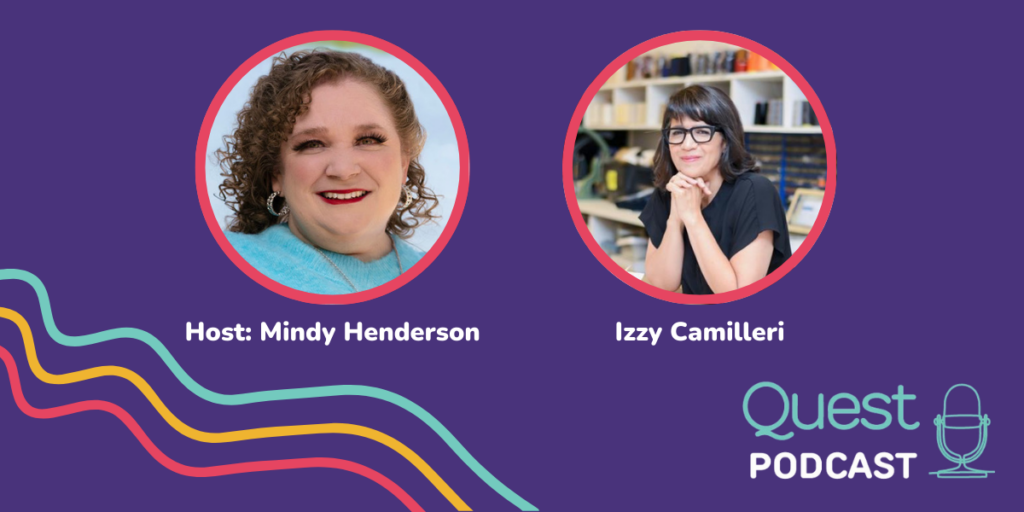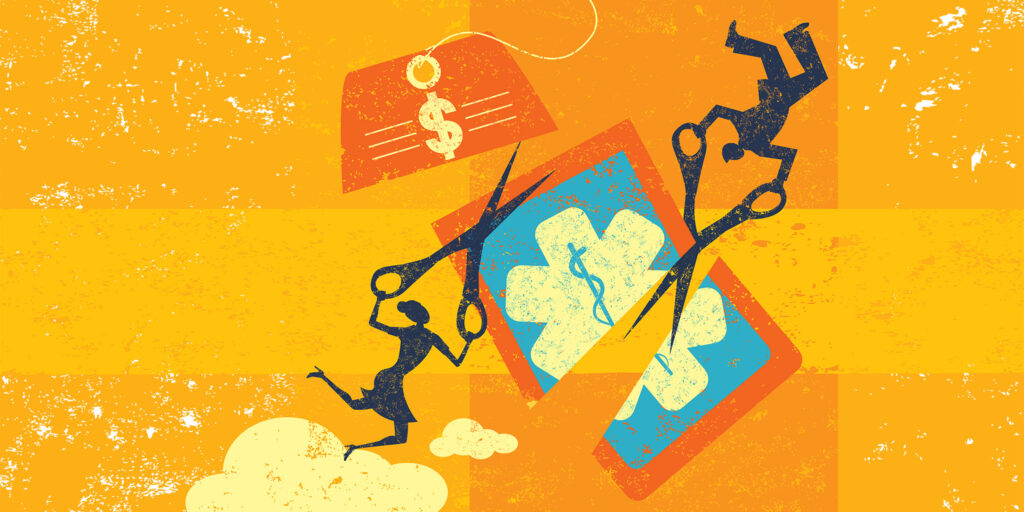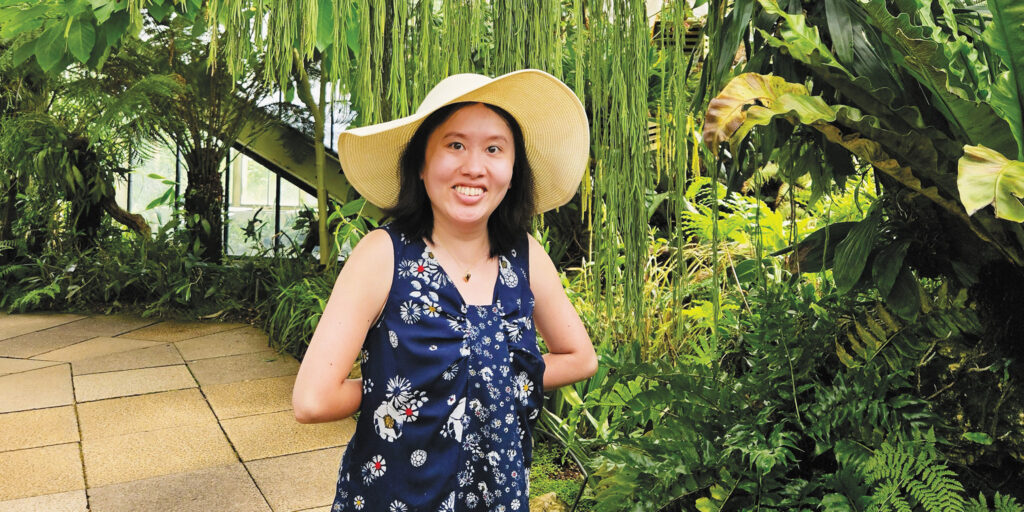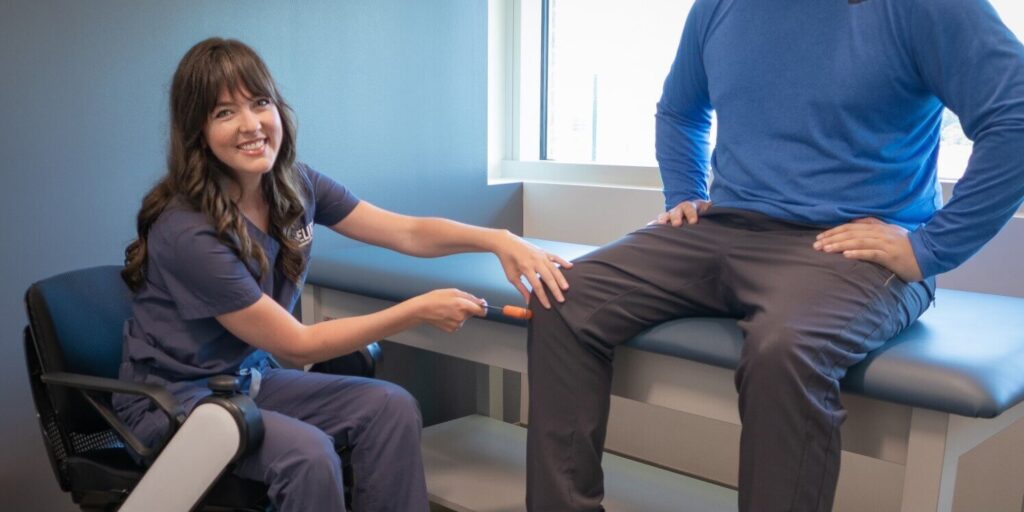
Quest for Success: Corinne Grgas
By Rebecca Hume | Thursday, June 30, 2022
5 Second Summary
Quest for Success explores the different paths that individuals with neuromuscular disease have taken to reach their potential and pursue dreams. This series spotlights individuals from our community and shares their journey to independence and accomplishment.
As the Muscular Dystrophy Association (MDA) continues our commitment to empowering people living with neuromuscular disease, we are excited to share our 2022 blog series: “Quest for Success”.
Success looks different to everyone and this monthly blog details the different paths that individuals with neuromuscular disease have taken to reach their potential and the steps they took to get where they are today. Each month we spotlight one individual from our community and share his or her journey to independence and accomplishment. We hope that these stories empower and inspire our readers to unlock the possibilities in their own lives…because the possibilities are limitless.
Nurse Practitioner Finds Purpose in Career and Community
In 2017, Corinne Grgas had recently married the love of her life, earned her doctorate at Belmont University in Nashville, and accepted a position as a nurse practitioner for Elite Sports Medicine & Orthopaedics, an elective surgery private practice. She was happily diving into the start of an exciting new chapter when she received news that changed her life. A few weeks before her graduation, Corinne was diagnosed with a form of distal myopathy known as GNE myopathy, a progressive neuromuscular disease that primarily affects the skeletal muscles. Her initial fear, that she wouldn’t be able to pursue the career she had worked so hard for, was soon replaced with steely determination and a valuable understanding that having a physical disability does not disqualify you from achieving your dreams.
The now 31-year-old nurse practitioner discovered that not only is she able, but that her disability provides her with a unique understanding of her patients and has introduced her to the power of an incredible community of individuals and families living with neuromuscular disease.
Early determination, early goals
Corinne’s father always commented on how incredibly determined she was as a child. She loved a challenge and grew up with parents who encouraged her to focus on goals and aim high for her future. Surrounded by ambitious family and friends who placed significant value on higher education, Corinne began thinking about her future at a young age.
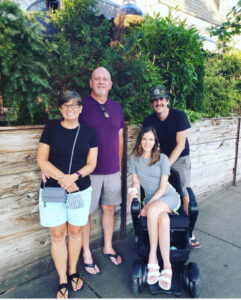
Corinne with her parents and husband, Luke
Fascinated by the way that the human body works, Corinne fell in love with anatomy and science in high school. She took high level math and science classes and followed a college preparatory curriculum, knowing that she wanted to pursue a career in the medical field. When she met a nurse practitioner at her high school’s career fair, she recognized the role that she would seek.
Corinne earned an undergraduate degree from Trevecca Nazarene University in Nashville and then went on to earn her doctorate at Bellmont University in Nashville. She went into the field with an open mind, uncertain of which specialty route she would take. During a cardiology rotation, she noticed that nearly every patient also reported back pain. Corinne decided to write her dissertation on back pain and arranged to do her rotation with a spine surgeon. That same surgeon offered her a full-time position when she graduated.
Newly graduated, newly hired, and newly diagnosed
By 2017, Corinne had been experiencing some leg and hand weakness for a couple of years. She noticed that she fatigued quickly on stairs and had some difficulty with her fine motor skills. When Corinne received her diagnosis, her initial emotion was fear. She was uncertain if she would be able to navigate the physical requirements of her new job as her disease progressed. She evaluated the physical requirements that her position required – manipulating limbs, injecting patients with medication, making rounds – and was fearful that disclosing her diagnosis would put her job in jeopardy.
Never one to back down from a challenge, Corinne and her husband began researching and discussing her options. Corinne’s husband, Luke Grgas, is an avid researcher and planner. He collected resources and information that enabled her to assess her abilities and potential accommodations that she might need. Her initial fear that her career would be over before it started soon gave way to faith and determination that she could – and would – continue to follow her dreams on her quest for success.
Because she was already hired but had not yet started her new position at the time of her diagnosis, Corinne had not had to consider disclosing her disability in the interview process but needed to decide how to disclose as a hired employee. Nervous to disclose, she first met with a family friend who works in the HR field and discussed things to consider when disclosing a disability and her rights under the Americans with Disabilities Act. She reviewed appropriate and empowering ways to verbalize her needs. She then met informally with the spine surgeon who had hired her and disclosed her diagnosis. She also met with the HR manager at her health network for a formal disclosure and to discuss the disease process and potential future needs. Corinne shares that the surgeon and her team have been nothing but extremely supportive. They were eager to make accommodations and put a plan in place for the HR manager to check in with Corinne every 6 months to see if needs have evolved or changed.
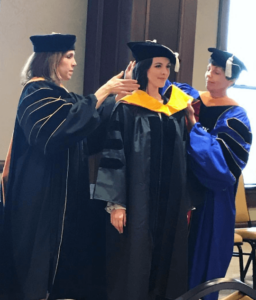
Corinne at graduation
“They have made me feel very valuable,” Corinne shares, elaborating that her employer has made it clear that they will do everything that they can so that she can do her job to her highest potential.
Accommodations at work
Corinne uses a power wheelchair as her primary mode of mobility at work. She can walk for a few moments at a time, but her legs become weak and unsteady making her prone to falling. She also has drop-foot and wears AFOs on both feet to help limit the increased fall risk. When working at the hospital clinic or while doing rounds on the surgery floor, Corinne will usually use her wheelchair to get from room to room and then leave the chair outside of her patient’s room and walk in. On days when she experiences a higher level of muscle fatigue, she stays in her power chair while visiting patients.
At work, HR provided Corinne with equipment that allows her to use voice to text dictation for charting and making notes to accommodate muscle fatigue in her hands. “With the way that technology is going, I think there is a lot of opportunity for people with disabilities to have careers now. Which is incredible. I encourage people to pursue that,” Corinne says, adding that working reinforces how able she is.
Because she works in a medical facility, there were not many physical barriers that needed to be addressed. The bathrooms are accessible and every building on site has elevators. When staying late to finish charting one night, Corinne learned the hard way that the front desk attendants lock those elevators when they leave for the evening. Stranded on the third floor, Corinne needed to be carried down three flights of stairs by a nurse colleague – who then also carried her heavy power chair down those same flights. Corinne quickly developed a protocol with the front desk to ensure that someone reaches out to her before locking the elevators at night.
Grateful that her HR representative is diligent in checking in with her every six months, Corinne advises others to be proactive in updating their own HR departments as their needs change. “It’s really nice that my employer reaches out to me, but you can’t expect that. So really advocate for yourself as your needs progress,” she says. “It can feel scary to ask, because you don’t want to be a drain on your company, and you want to be valuable. But sometimes you need to ask for what you need so that you can be valuable.”
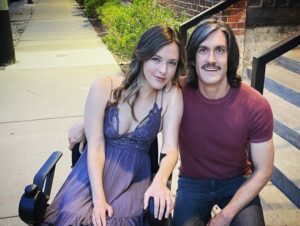
Corinne and her husband, Luke
Corinne approached her HR representative with the need to adjust her schedule when she felt concerned that she was not physically able to see all the patients assigned to her. She was having trouble walking in the evening and getting out of bed in the morning and recognized that she needed to adjust her physical activity during the day. She worked with HR to adapt her schedule and allow more space and time between patients.
Navigating at home and staying active
Corinne lives at home with her husband, Luke, in Nashville. They had been married for 6 months when she was diagnosed. Corinne is quick to share that Luke is incredibly supportive, motivating, and helpful. He takes responsibility for the housework, cooking, cleaning, and laundry. He occasionally assists her with dressing or doing her hair if she is especially fatigued. She does not financially qualify for formal caregivers and is grateful for her husband’s unwavering informal support.
Luke also assists Corinne in getting out of the house in the morning so that she does not need to make multiple trips between the car and home. While they are looking to move into a more accessible home, their current residence is not wheelchair accessible. Corinne leaves her powerchair in her van overnight and walks using a cane at home.
Corinne and Luke researched and purchased an already-modified van on Craigslist. The van has a ramp on the side to wheel her power chair in and out and has a swiveling driver seat. Her vehicle does not have hand brakes at this time, but she anticipates needing them in the near future and plans to reach out to her local occupational and educational rehabilitation services for assistance in funding and modifications.
Just as Corinne refused to allow her prognosis to slow her down in her career, she also overcame boundaries by pursuing adaptive recreation and staying active. Luke and Corinne both enjoy being outdoors and finding new adventures. Since her diagnosis, Corinne has gone adaptive skiing, hang-gliding, and scuba diving. She enjoys spending time with friends and family. And she also cherishes the new community and incredible friendships that she has found because of her diagnosis.
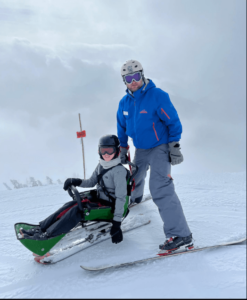
Corinne adaptive skiing
The power of community
Corinne shares that the most powerful resource for her has been building relationships with others in the neuromuscular community. “Reaching out to other people who have been through it is the most beneficial way to get practical advice,” Corinne says. “Googling and research is overwhelming. Sit down and talk to actual people, and they can tell you what to do and what not to do.”
After she was diagnosed, Corinne joined Facebook groups and an online GNE page and she registered with MDA. Corinne shares that she has met and built significant friendships since becoming involved with the MDA community and MDA events. She met a local woman with the same diagnosis at her local MDA Muscle Walk and the two became friends. They chat frequently about their disease and about life. Corinne finds value in having someone whom she can reach out to her with questions and for support.
Corinne also read an article in Quest magazine that featured an older man living with limb girdle muscular dystrophy (LGMD) nearby in Tennessee. She found his address and mailed him a letter. That letter sparked the beginning of a years long friendship between him and his wife and Corinne and Luke. He had been living with a neuromuscular disease for much longer than Corinne and became a mentor to her. Dinners, trips and visits, and long conversations set the foundation of an incredible relationship. While he has since passed away, Corinne and her husband stay in close contact with his wife.
Corinne advises people living with a disability to connect with their community. The support and resources that others can share is both heartwarming and empowering. “Each person’s story is a reminder that you can achieve whatever goal you set for yourself – you are able,” Corinne says.
Disclaimer: No content on this site should ever be used as a substitute for direct medical advice from your doctor or other qualified clinician.


